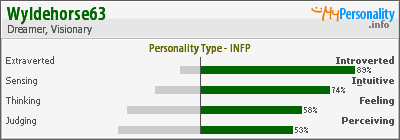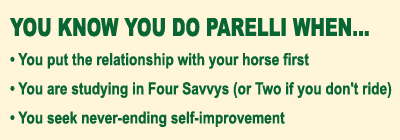This is my online journal of my forays into the world of
Parelli Natural Horse-Man-Ship
with my equine partner
Cheerios. Everything that happens
with us,
good and bad, will be exposed for the world to see.
R.I.P. Wildflower 19?? - 2005, my first levels partner.
Monday, March 24, 2008
New Beginnings
The 50-degree play day I anticipated didn't quite pan out. The trim took place—all good news—but the weather wasn't as conducive to play as we'd hoped. It rained. It was warm, but it rained.
Shaveya's feet, wow. I wish I'd had a camera at the time to take photos of her feet before and after. The after is amazing. We started the NHCP journey in the late summer of 2005, and two-and-a-half years later, Shaveya has received a miracle healing. That's all I can call it: a miracle. I was watching over the shoulder of my trimmer and I was astounded. Shaveya's hooves are spreading to a normal, supportive size. They are deeply concaved, have a wonderful solar depth, a healthy frog, and are rock-solid. She no longer limps. When she pivots, she moves like a "normal" horse should move. She canters happily in the pasture.
This is the same horse whose condition a year ago was so bad that it got me chased down by a vicious boarder (at the old barn) who verbally attacked me for "neglecting" my horse then threatened to call the Humane Society and report me for abuse. The same horse that lead the barn manager at that barn to issue an ultimatum: shoe her, move her, or else. I spent a good 18 months defending my horse to that barn, and standing by my principles and philosophies (backed up by a supportive medical and hoof team) because I KNEW Natural Hoof Care and the dietary change would work. Eighteen torturous months being on the receiving end of accusations, threats, and nasty attitudes because I refused to conform and do what others thought was right.
This horse is healed.
In addition, her entire demeanor has improved. She came to me a shy, unconfident, nervous wreck. She used to tense up all the time and panic easily. She didn't trust anyone, human or equine. She couldn't stand still during trimming appointments. She kicked out defensively.
Well, that horse has left the building. The Shaveya I have with me now has developed confidence, bravery, and has overcome her nervousness. I suspect the Chinese herbs helped, as did relocating to a smaller barn (from 40 horses down to 12). She is in a mixed herd and gets to hang out with Cheerios, whom she likes a lot. Laugh if you must, but the animal psychic I had read her once (out of fun and curiosity) told me Cheerios was her boyfriend. OK... maybe so. They're together, either way. She stands beautifully on a loose line for the trimmer. She lifts her feet politely. She no longer kicks.
She's happy.
The only thing that concerns me is that she's a bit skinny coming out of winter. My guess is that because she feels better, she's moving around more than she ever did, so her food intake needs to increase to keep up with that. Otherwise, she seems fine. I'll watch her as the warmer days arrive. If she stays skinny, I'll call the vet.
Cheerios is great as always. He celebrated his 11th birthday Saturday (Shaveya turned 10 on the 4th). I have one Pisces horse and one Aries. It is interesting that my parents had those same birth signs. (Cheerios' birthday is the day before my Mother's.)
I have a new "job". It's to offset board fees. I'm shoveling. Yup. Cleaning stalls. But there's more.
The BM at this barn, S, is a very sweet gal in her mid-20s. She's married with a year-old daughter. She has a full-time day job. She also gives riding lessons, works with 4H, shows, competes, and trains horses.
And she asked ME if I'd be interested in helping her out with HER horses. As part of the board deal. Basically, do my thing with them, play with them, ride them if I want. Interact with them and get them "going" for the upcoming season.
I was floored.
Me?
Now, she is naturally-inclined but not Parelli. However, she's very interested in PNH. VERY interested. Positive interested. As in, could probably be a "convert" without much further encouragement. (It's a very supportive environment—a couple other boarders do Parelli, though as the one said, not exclusively, which I guess is all right for them; as for me, I'm monogamous.) As in, asks ME for advice—and she's the trainer. But it's on a peer-to-peer basis, not the usual "I'm the trainer—let's just see how much you really know *snort*" that so many of my PNH pals encounter. It's more like she considers me at (or maybe above?) her level of knowledge.
Which I find very interesting.
On one occasion last fall, she had the unusual experience of being unable to catch her main horse and was telling me about it. I asked if she'd mind if I tried something with him. She said "Sure, go ahead". I said "OK" and asked her to come with me and we went into the pasture to get him. The whole time I pointed out things to watch for, like his ears, body position, and so on, what it meant and the like. Did the approach/retreat. Basically played the catching game with him while explaining why I was doing what I was doing. It worked, of course. He caught us.
I took him into the round pen and played with him some more until he caught on and was following me all around the pen.
S told me the other day that since that session, she hasn't had one problem catching him.
That's why she wants me to play with her horses.
Five of them.
She's a bit stretched for time with the baby, the job and the barn, which I fully understand. I said yes. I'm absolutely flabbergasted, humbled, and astounded.
I know. I'm not L3 yet. I know they advise us to take one horse all the way through before developing any others, and I can understand why; they want us to deal with one set of horseanality issues before taking on a different set. But I have two horses myself—they are polar opposites and it has helped my horsemanship develop because I must adapt to each of them, often in the same day. I can see where it might work best for some people to focus on one horse at a time, but on the other hand, I can also see where that might lead one to become complacent. If your horse always behaves like X, you come to expect X as a response, and if you go too long like that, then when you get a new horse and he behaves like Y, well, it's like restructuring your entire ballgame.
The key to horsemanship is to be able to adapt quickly to the ever-changing responses from the horse. How better to learn flexibility and the ability to adapt than to adjust to several different horses throughout the week?
They aren't difficult or challenging horses, this bunch—they are everyday horses like mine. Cheerios is actually a tad challenging. S says he's one of the smartest horses she's ever seen. That intelligence and confidence is what makes him a higher-level horse than most others. I say this not with pride or ego, mind you—just that I know I have the savvy to know whether or not to move forward with this.
My plan is to play a bit with each of her horses and see what shows up. If anything appears to be more than I can handle, I'll step away. If I'm unsure about how to approach something, I'll either leave it, stop playing with that one, or ask for help from an instructor. I won't try to solve anything by myself that is outside of my current level of horsemanship. I've been soaking up Liberty & Horse Behavior as well as the new Success Series (I have ALL the DVDs, videos and Levels programs, except for the one about raising foals). And I certainly will begin online on the ground first! No riding! I'm confident, but I'm not stupid. LOL!
My guess is, she sees something in me that maybe I don't see in myself. She is very particular about her horses and her barn, which is why she won't hire an outsider to clean. She wants someone she trusts. That she trusts ME to help develop her horses says a lot to me.
There is another aspect to it. If I do want to be a PNH Instructor someday, the experience will begin much like this. From what I understand, the Instructor trainees start at the bottom once accepted. They help out at the centers and on tours. That means what you think it does: cleaning stalls, handling turn out, feeding, watering, grooming, being a go-fer, fixing fences, cleanup, building stuff, maintenance... in addition, studying horsemanship and instructorship, developing the horses that are assigned to you, and IF you can squeeze it in, playing with your own horses. After a good year of that, if you move up to the next level, the duties are more teaching-oriented and less about chores. It gets better from there. As you rise in the ranks, your duties become more teaching and horse oriented and less chore-oriented.
So the three aspects are: barn chores, horse development assignments, and your own horsemanship goals.
Kind of like what I'm starting now at the barn. I see it as good preparation for my future.
I cleaned six of 12 stalls Friday and it took me three days to recover. (Laugh. Go ahead. I'm out of shape. But not for long.) Tomorrow, the REAL fun begins.
Subscribe to:
Post Comments (Atom)


No comments:
Post a Comment